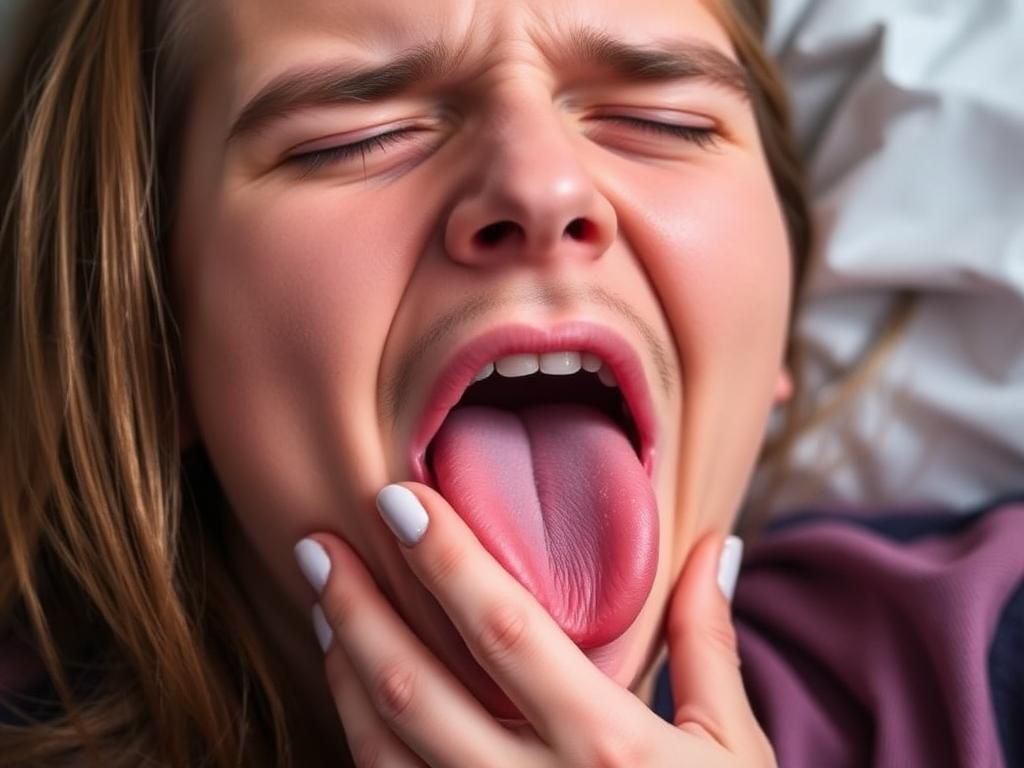Sleep is essential for our health and well-being, but many people experience unusual nocturnal behaviors that disrupt their rest. One such behavior is biting tongue during sleep, a phenomenon that can cause discomfort, pain, and even anxiety for those affected. Understanding the causes, effects, and prevention tips for tongue biting during sleep is vital for improving sleep quality and overall health. This article will dive deep into the various aspects of this issue, providing practical tips and insights.
What is Tongue Biting During Sleep?
Definition and Explanation
Biting tongue during sleep refers to the involuntary act of clenching or biting the tongue while sleeping. This behavior can manifest as either occasional incidents that may not lead to significant harm or recurrent episodes that can cause chronic pain and discomfort. Frequent occurrences may indicate underlying sleep disorders or stress-related issues that need further examination.
Common Indicators
There are several signs that may indicate an individual is biting their tongue during sleep:
- Waking up with pain or discomfort: Individuals may notice soreness or a burning sensation on the tongue upon waking.
- Frequent oral injuries: Recurrent cuts or injuries on the tongue may be a sign of nocturnal biting.
- Unexplained swelling or soreness of the tongue: Individuals might experience persistent swelling, which could indicate a pattern of biting during sleep.
Causes of Tongue Biting During Sleep
Sleep Disorders
Several sleep disorders are associated with biting tongue during sleep, including:
- Sleep apnea: This condition causes blocked airflow during sleep, often leading to abrupt awakenings and startling muscle activity, potentially resulting in tongue biting.
- Bruxism (teeth grinding): Teeth grinding can result in pressure against the tongue, leading to accidental biting.
- Night terrors: These episodes can cause intense episodes of fear or panic, resulting in sudden muscle clenching and potential tongue biting.
Stress and Anxiety
Psychological factors play a crucial role in biting tongue during sleep. Increased tension and muscle clenching during sleep, often fueled by anxiety, can lead to involuntary tongue biting. Research suggests that heightened anxiety levels negatively impact sleep quality, further worsening the problem.
Neurological Factors
Certain neurological conditions may contribute to nocturnal tongue biting, including:
- Seizure disorders: Some individuals may inadvertently bite their tongue during seizures, which often occur during sleep.
- Neuromuscular issues affecting jaw function: Conditions that impair muscle control can lead to involuntary movements that may result in biting the tongue.
Lifestyle and Habits
Biting tongue during sleep can also be influenced by lifestyle choices, including:
- Alcohol consumption: Alcohol can disrupt normal sleep patterns and muscle coordination, contributing to tongue biting.
- Substance use: Certain substances may impair muscle control and impact sleep quality.
- Caffeine intake: High caffeine consumption before bedtime can make it more difficult to relax and lead to increased muscle tension during sleep.
- Eating before bedtime: Late-night meals may be associated with sleep disturbances that contribute to accidental biting.
Effects of Tongue Biting During Sleep
Physical Consequences
The physical consequences of biting tongue during sleep can range from minor to serious:
- Cuts and lacerations: Frequent tongue biting can lead to painful cuts that may require medical attention.
- Chronic pain or soreness: Persistent biting can result in long-term discomfort that affects speech and eating.
- Risk of infections: Open wounds can become infected, leading to further complications.
Psychological Effects
In addition to physical harm, there are psychological effects associated with recurrent tongue biting:
- Anxiety and stress: The concern about tongue biting during sleep may lead to increased anxiety and stress during waking hours.
- Impact on overall sleep quality: Chronic discomfort can result in fragmented sleep, affecting both mental and emotional well-being.
Diagnosis and When to Seek Help

Self-Assessment Techniques
To better understand if one is biting their tongue during sleep, self-assessment techniques can be beneficial:
- Observational signs to monitor: Family members or partners can observe sleep behaviors and any signs of tongue biting.
- Keeping a sleep diary: Documenting sleep patterns, discomfort, and injuries can help identify links between sleep and tongue biting.
Professional Evaluation
When symptoms persist, it is important to seek professional evaluation. The types of healthcare professionals to consult include:
- Dentists: They can assess and provide treatment for oral injuries related to tongue biting.
- Sleep specialists: Specialists can evaluate for sleep disorders that may contribute to tongue biting.
- Psychologists or therapists: They can address underlying psychological issues such as anxiety or stress.
Diagnostic Tools and Procedures
Healthcare professionals may recommend specific diagnostic tests, including:
- Sleep studies (polysomnography): This test can monitor sleep patterns and identify disturbances that lead to tongue biting.
- Oral examinations: Dentists can provide visual assessments of the tongue and mouth for injuries or abnormalities.
| Diagnosis Type | Description |
|---|---|
| Self-Assessment | Monitoring signs and keeping a sleep diary |
| Dentist Evaluation | Assessment of oral injuries and dental health |
| Sleep Study | Monitoring sleep patterns for disturbances |
| Psychological Evaluation | Counseling for anxiety and stress-related issues |
Treatment Options
Behavioral Strategies
Several behavioral strategies can help reduce tongue biting during sleep:
- Stress management practices: Techniques like meditation, yoga, and deep breathing can lower overall tension and reduce muscle clenching.
- Cognitive-behavioral therapy (CBT): This approach aims to address thought patterns that contribute to anxiety and stress.
Dental Interventions
Dental professionals can offer interventions that mitigate the impact of tongue biting:
- Use of mouthguards or splints: Custom-fitted devices can protect the tongue and teeth while minimizing damage from grinding.
- Importance of regular dental check-ups: Regular visits ensure that any signs of teeth grinding or tongue injuries are addressed promptly.
Medical Treatments
In certain cases, underlying conditions may require medical treatment:
- Antidepressants or anti-anxiety medications: Such medications may help manage underlying psychological factors contributing to nocturnal tongue biting.
- Treatments for sleep disorders: Addressing conditions like sleep apnea through continuous positive airway pressure (CPAP) therapy may reduce tongue biting incidents.
Prevention Tips
Establishing a Relaxing Bedtime Routine
Creating a peaceful environment and routine before bed can help improve sleep quality and may alleviate issues related to biting tongue during sleep:
- Limiting screen time: Reducing blue light exposure before sleep can promote better rest.
- Creating a calming environment: Darkening the room and minimizing noise can help signal the body that it is time to sleep.
- Gentle stretching or relaxation exercises: Incorporating stretches or mindfulness activities can reduce pre-sleep tension.
Healthy Lifestyle Practices
Maintaining a healthy lifestyle is crucial for improving sleep quality:
- Importance of diet and hydration: A balanced diet and proper hydration can minimize nighttime discomfort.
- Managing stress through physical activity: Regular exercise can reduce stress levels significantly.
Avoiding Triggers
Identifying and eliminating potential triggers is essential for preventing tongue biting:
- Identifying and eliminating factors that may worsen the issue: Being aware of personal triggers, such as stressors or dietary habits, is key.
- Keeping a consistent sleep schedule: Regular sleep patterns can help inform the body when it’s time to rest.
Conclusion
Understanding the causes and effects of biting tongue during sleep is essential for improving sleep health. Those experiencing symptoms should monitor their signs and consult with healthcare professionals for appropriate evaluations and interventions. By implementing practical strategies for prevention and seeking help, individuals can achieve better sleep quality and overall well-being.
Additional Resources
For more information on sleep disorders and their impacts, consider checking out The Sleep Foundation or the American Dental Association.
FAQs
1. What should I do if I think I’m biting my tongue while sleeping?
It is essential to monitor your symptoms. Keep a sleep diary and consult with a dentist or sleep specialist for further evaluation.
2. Can stress really cause tongue biting during sleep?
Yes, increased anxiety and stress can lead to muscle tension and involuntary movements during sleep, resulting in tongue biting.
3. What are the long-term effects of biting my tongue during sleep?
Potential long-term effects include chronic pain, infections, and an increased risk of anxiety related to sleep disturbances.
4. Are there specific treatments for tongue biting?
Treatment can include behavioral strategies, dental interventions like mouthguards, and medical therapy for associated conditions.
5. Is it common to bite your tongue at night?
While it can happen occasionally, recurrent tongue biting is less common and may indicate an underlying issue that requires attention.
6. Can lifestyle changes help prevent tongue biting during sleep?
Absolutely! Healthy lifestyle practices such as stress management and establishing a calming bedtime routine can significantly reduce occurrences.
7. How can I tell if my tongue biting is due to a sleep disorder?
If you experience consistent symptoms or discomfort, it’s best to consult a healthcare provider for a thorough assessment.
8. Should I see a dentist or a sleep specialist for tongue biting?
Both specialists can be helpful; dentists assess the physical damage and oral health, while sleep specialists focus on sleep disorders that might cause the issue.
9. Does biting my tongue affect my oral health?
Yes, recurrent tongue biting can lead to cuts, infections, and other oral health issues that require intervention.
10. Can medication help with my tongue biting problem?
In some cases, medications for anxiety or sleep disorders may help; consult with a healthcare professional for individualized recommendations.
